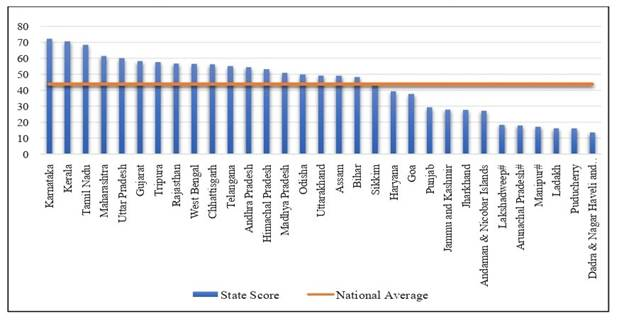Syllabus: GS2/Polity and Governance
Context
- The Union Ministry of Panchayati Raj has released the report titled ‘Status of Devolution to Panchayats in States – An Indicative Evidence-Based Ranking’ (2024).
About
- The devolution index is an approach in assessing the implementation of 73rd and 74th Amendments and is prepared by the Indian Institute of Public Administration.
- It evaluates the current state of power and resource devolution to Panchayati Raj Institutions across all States and Union Territories.
- States/UTs were ranked as per the six key dimensions of framework, functions, finances, functionaries, capacity enhancement, and accountability.
Need for the Assessment
- The mandatory constitutional provisions— such as regular Panchayat elections by state election commissions, reservations for SCs/STs and women, and the constitution of state finance commissions—have been implemented.
- The devolution of functions, finances, and functionaries to Panchayats has been inconsistent across States.
- The effective local governance cannot be achieved through these transfer mechanisms alone.
- It necessitates ‘capacity enhancement’ measures and ‘accountability’ to ensure fairness and transparency in Panchayat operations.
Major Findings
- Karnataka tops the overall Devolution Index (DI) ranking of the Panchayat Raj system among States, while Kerala and Tamil Nadu are in the second and third spot.
- Devolution has increased from 39.9% to 43.9% between the period 2013-14 to 2021-22.

- With the launch of the Rashtriya Gram Swaraj Abhiyan (RGSA), the capacity enhancement component of the Index during this period has increased from 44% to 54.6%.
- During this period, the component of the Index pertaining to functionaries has seen a substantial jump of more than 10% (from 39.6% to 50.9%).
- In the framework criterion, Kerala ranks first followed by Maharashtra, Karnataka, and Haryana.
- In the functional criterion, Tamil Nadu tops the list followed by Karnataka, Odisha, and Rajasthan.
- In the finances criterion, Karnataka has secured the top place followed by Kerala, Tamil Nadu, and Rajasthan.
- In the functionaries criterion, Gujarat ranks first followed by Tamil Nadu and Kerala.
- In the capacity building criterion, Telangana has secured the first spot followed by Tamil Nadu and Gujarat.
Challenges Identified in Report
- Legal and Institutional Gaps: Some states have not conducted regular panchayat elections.
- Limited Role in Policy Implementation: Panchayats have a nominal role in major centrally sponsored schemes (MGNREGA, PMAY, NHM, etc.).
- Disparities Among States: Some states perform significantly better due to strong governance structures and legal provisions, while others struggle due to poor implementation and political unwillingness.
- Low Public Participation: Gram Sabhas, which are essential for participatory governance, are often poorly attended and lack effectiveness.
Recommendations and Suggestions
- Strengthening the Legal Framework: Ensure regular and timely elections for panchayats.
- Empower State Election Commissions (SECs) to function independently without state government interference.
- Financial Empowerment: Establish a Consolidated Fund for Local Government to provide direct and assured funding to panchayats.
- Implement recommendations of the 16th Finance Commission to ensure panchayats receive an adequate share of GST revenues.
- Enhancing Functional Autonomy: Decentralize key service delivery functions to ensure panchayats play a leading role in rural development.
- Promoting Accountability & Transparency: Strengthen Gram Sabha participation by making them more accessible and effective.
Source: TH
Previous article
Indian Ocean: Strategic Significance & India’s Role